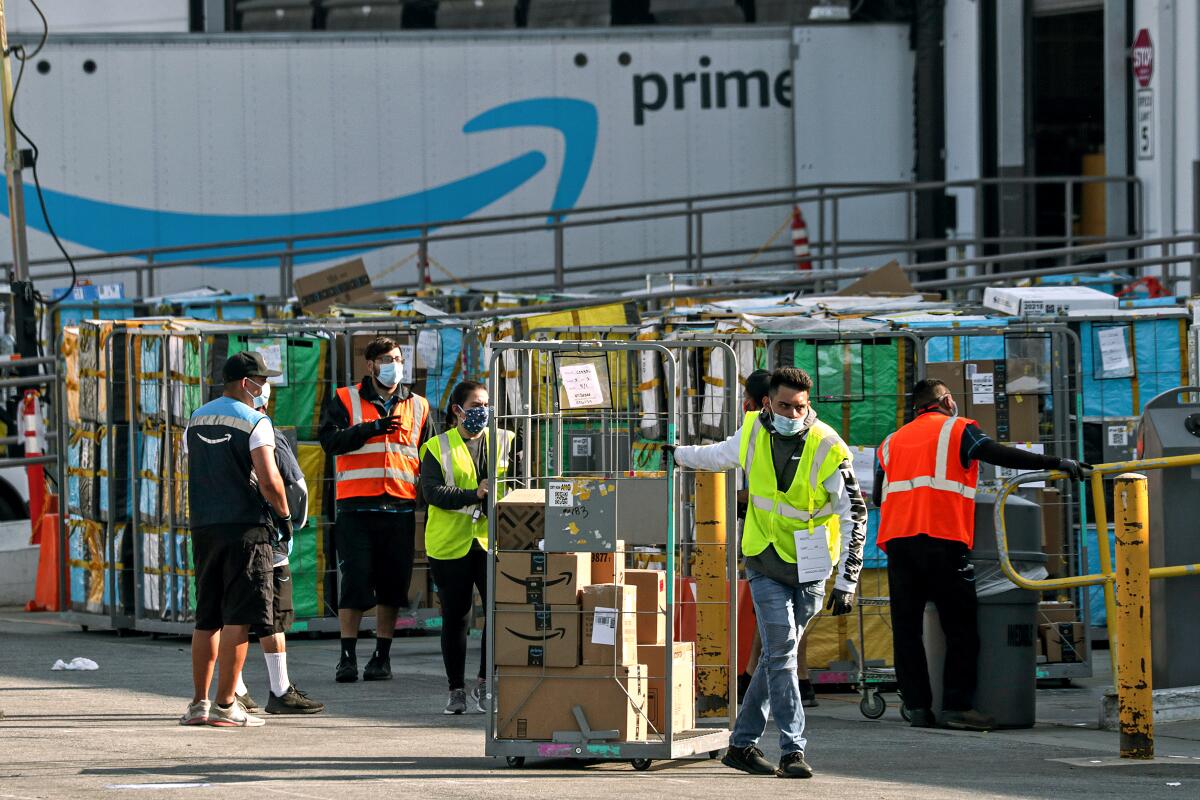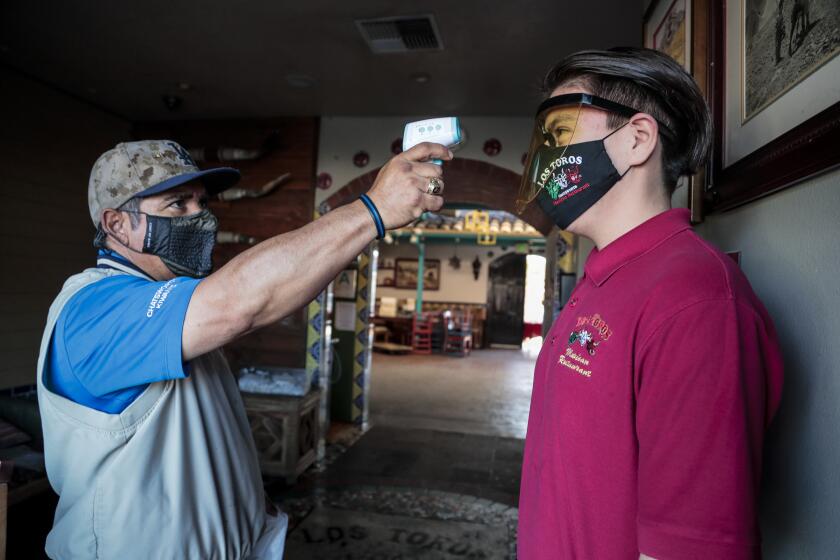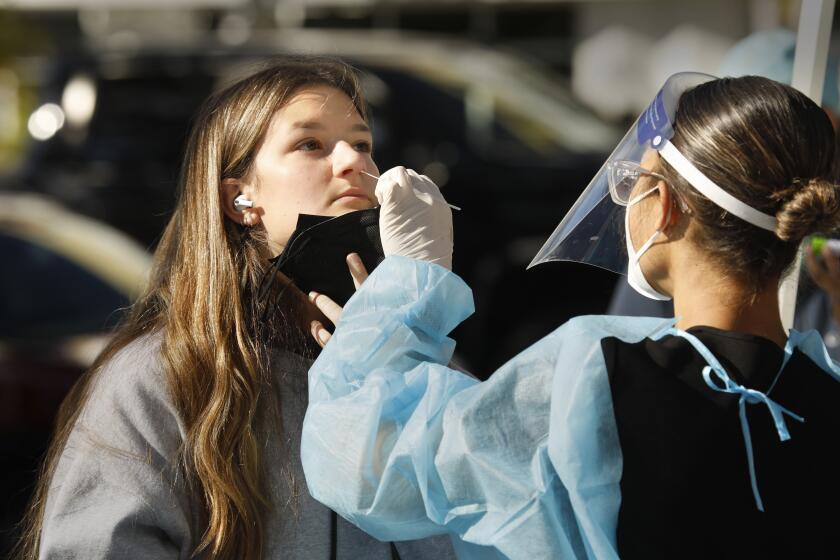New COVID-19 sick pay for California workers approved by lawmakers

- Share via
SACRAMENTO — California lawmakers passed legislation on Monday to provide most workers with up to two weeks of COVID-19 supplemental paid sick leave, a move policymakers hope will slow the spread of the coronavirus across the state.
“We all are quite aware of the surge of COVID-19 cases, and this act will help ensure that those employees that are sick can take the paid sick leave that they need so all of us are protected,” said Sen. Nancy Skinner (D-Berkeley).
For months, labor unions lobbied legislators and Gov. Gavin Newsom to renew the state’s sick leave mandate that expired in September. The new policy includes many of the same provisions of the 2021 law with some new rules negotiated by the business community to prevent abuse of the system.
The Legislature passed the proposal in conjunction with several other bills that provide companies with relief from unrelated tax limits the state placed on businesses in the early stages of the pandemic, and give Newsom an additional $1.9 billion in state budget funds to address testing, vaccinations, hospital surges and other COVID-19 emergency needs.
“As the Omicron surge intensified, workers screamed from the rooftops about the desperate need to reinstate COVID paid sick leave,” California Labor Federation Executive Secretary-Treasurer Art Pulaski said in a statement. “The governor and Legislature heard frontline workers loud and clear, and we appreciate them acting with urgency to get this done. Once again, California shows it’s a national leader on worker protections and COVID mitigation.”
California officials hope the return of state-mandated COVID-19 sick pay will encourage infected workers to stay home and help slow transmission.
The sick leave policy allows all workers at businesses of 26 or more employees to take paid time off to recover from COVID-19, care for a sick family member, attend a vaccination appointment, recover from immunization or take care of a child who cannot attend school because of virus-related closures or quarantines.
Business interests negotiated to allow companies to require employees to submit proof of a positive test to qualify for more time off after their first 40 hours are exhausted. In addition, the new policy limits workers to three days, or 24 work hours, to attend a vaccine appointment or recover from vaccine-related side effects, another request of business interests.
“California employers continue to do their part to keep employees and the public safe during this pandemic,” Jennifer Barrera, president and CEO of the California Chamber of Commerce, said in a statement. “The COVID-19 supplemental paid sick leave is another example of this, where employers will take on an additional burden to provide leave, but do so in order to protect the broader public.”
Assemblymember Vince Fong (R-Bakersfield) voted against the sick leave legislation, saying it would hurt small businesses. Federal tax credits that offset California’s last sick leave mandate expired last year, and Fong questioned why California would not provide a new tax credit or exemption for employers.
“This policy that is being rushed through the Legislature needs a tremendous amount more debate and discussion,” he said. “This proposal is going to layer additional costs and burdens on top of an already difficult business environment.”
As part of the agreement between the governor and legislative leaders to extend sick leave, the legislation was tied to several other proposals in Newsom’s 2022-2023 budget plan last month that restore tax credits the state suspended and capped two years ago when officials feared the pandemic would damage the state’s economy.
California would spend $2.7 billion on new efforts to respond to COVID-19 cases under a budget proposal Gov. Gavin Newsom will send to lawmakers next week.
In 2020, the state suspended net operating loss deductions for corporate and individual taxpayers with business income of $1 million or more in tax years 2020, 2021 and 2022. One of the bills passed Monday would end the suspension of the tax credit one year early.
The legislation also removes a $5-million cap on most other business tax credits that were previously limited through the end of 2022. The bill allows businesses to receive a refund for any amounts in excess of the cap that could not be used in 2020 and 2021, or use the unused credits to offset taxes for the next five years.
The bills passed Monday also create tax conformity in California with federal Restaurant Revitalization Fund and Shuttered Venue Operators grants that supported restaurants, bars and other businesses during the pandemic.
As part of the deal, lawmakers approved an additional $1.9 billion for California’s COVID-19 emergency fund. The funding includes $1.6 billion to the Department of Public Health for contact tracing, hospital surge, state response, statewide testing, vaccine distribution and administration, and information technology. Legislators approved an additional $205.5 million for the California Department of Corrections and Rehabilitation to provide care for COVID-19, minimize exposure to the virus and boost testing in state prisons.
With Newsom’s signature expected this week, the sick leave legislation will be retroactive to Jan. 1 and expire on Sept. 30.
More to Read
Sign up for Essential California
The most important California stories and recommendations in your inbox every morning.
You may occasionally receive promotional content from the Los Angeles Times.













